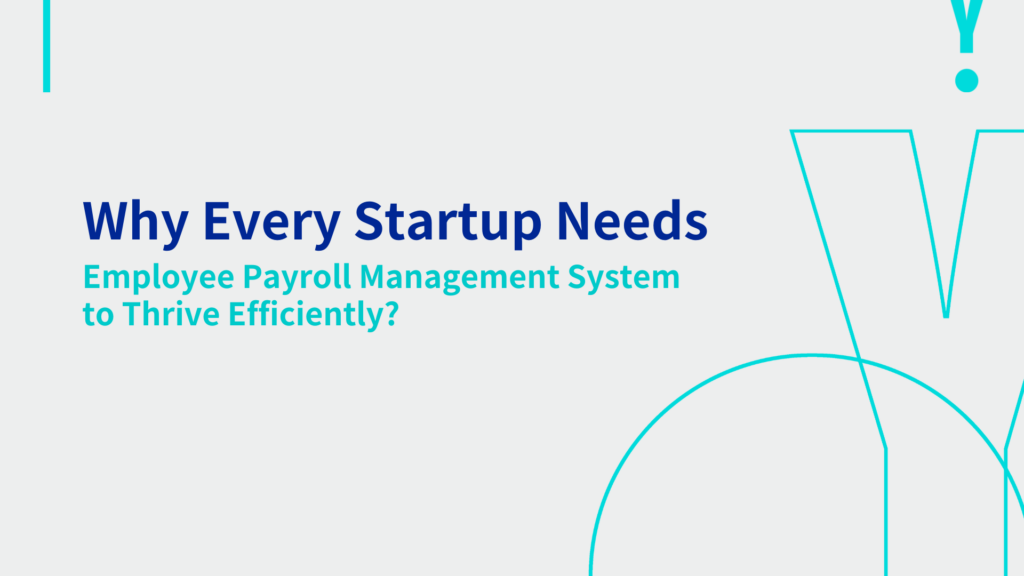
Running a startup is thrilling, but it’s also packed with unpredictable challenges every day. From scaling operations to hiring top talent, every decision matters. However, amidst all the chaos, one crucial element often gets overlooked: your employee payroll management system.
Startups typically begin small, managing tasks manually or using basic tools. But as your team grows, so does the complexity. Late payments, calculation errors, and tax non-compliance can severely damage trust and credibility. Hence, streamlining payroll early in your journey becomes a game-changer.
With an effective payroll system, you ensure timely payments, compliance with legal requirements, and a satisfied workforce. Not to mention, it saves time and reduces the stress of manual payroll handling. In today’s digital age, automation isn’t a luxury; it’s a necessity.
So, let’s explore how a robust payroll system supports startup growth, ensures transparency, and fosters long-term sustainability for modern businesses like yours.
- What Is An Employee Payroll System?
- Why Payroll Is Mission-Critical for Startups?
- Key Features Every Startup Payroll System Should Include
- Cost Savings with An Efficient Payroll System
- Payroll Integration with Other Business Systems
- Cloud-Based Payroll: The Future for Agile Startups
- Real-Time Payroll Analytics Plus Reporting
- Avoiding Payroll Mistakes That Can Hurt Your Startup
- How to Choose The Right Payroll Software for Your Startup?
- Final Thoughts
What Is An Employee Payroll System?
An employee payroll system is software that manages salaries, deductions, taxes, bonuses, and other wage-related tasks. It automates salary disbursement, tracks attendance, calculates leave, and ensures every penny is accounted for accurately and compliantly.
More than just a calculator, it’s a financial backbone that guarantees payment processing without bottlenecks or mistakes. It reduces dependency on spreadsheets, prevents human error, and provides real-time access to crucial compensation data.
So, for startups juggling multiple responsibilities, a digital payroll system becomes a must-have to maintain financial clarity.
Why Payroll Is Mission-Critical for Startups?
Ensures Legal Compliance from Day One
Startups often operate lean, with limited knowledge of employment laws and tax regulations. That’s where payroll systems shine. They auto-update with changing tax rules, statutory deductions, and employee benefit structures—ensuring compliance is never compromised.
Missing deadlines or misreporting taxes can lead to costly penalties, audits, and reputational damage. Hence, having a payroll system minimizes these risks by managing compliance on autopilot.
Builds Trust Through Timely & Accurate Payments
Startups thrive on team trust. If employees don’t get paid correctly or on time, motivation plummets. Payroll systems automate payments and issue payslips without errors or delays. This consistent accuracy fosters employee confidence and reduces attrition.
Moreover, when salaries reflect proper tax deductions and leave adjustments, transparency is maintained across the board. Eventually, timely payroll becomes a symbol of professionalism for your growing startup.
Simplifies Record-Keeping And Audit Trails
Payroll isn’t just about paying employees—it’s also about recording every transaction for future reference. Manual processes often lead to disorganized files and inconsistent documentation. But a digital system stores everything securely and chronologically.
During audits or funding rounds, startups must show transparent payroll records to prove legitimacy and compliance. Thus, a proper system helps maintain audit trails and builds investor confidence in your operational credibility.
Key Features Every Startup Payroll System Should Include
Let’s look at essential features your startup payroll solution must offer for maximum operational efficiency:
- Automated Salary Processing
Say goodbye to manual salary disbursements and time-consuming bank transfers. Automation ensures smooth payouts every cycle.
- Tax Filing & Statutory Compliance
Look for built-in tools that calculate PF, ESI, TDS, and other deductions automatically based on the latest government norms.
- Customizable Pay Structures
Startups often offer variable salaries, ESOPs, and freelance payouts. Your system should support flexible payroll architecture.
- Leave And Attendance Integration
When payroll syncs with attendance data, you eliminate errors in salary calculations due to missed leaves or shifts.
- Employee Self-Service Portals
These portals empower your employees to download payslips, view leave balance, or update tax declarations independently.
- Multi-Currency & Remote Team Support
If you work with a global team, your system should handle multiple currencies and different tax rules effortlessly.
Cost Savings with An Efficient Payroll System
Many startups assume payroll software is expensive. Surprisingly, the opposite is true—it saves money in the long run. Manual errors often lead to overpayments, penalties, or delayed filings. A system avoids these costly issues with accurate processing.
Moreover, it eliminates the need for a full-time payroll manager in early stages—automating tasks saves both time and hiring costs. With fewer administrative hours, your HR team can focus on recruitment, training, and culture-building instead of crunching numbers.
Hence, over time, your payroll system pays for itself by boosting overall productivity and reducing financial waste.
Payroll Integration with Other Business Systems
Another key benefit of digital payroll is integration with other business platforms—HR, accounting, and project management tools. Syncing payroll with accounting software helps in tracking finances more efficiently.
So, when integrated with HR software, you get better visibility on performance, appraisals, and compensation planning. Additionally, integration allows for better analytics. You can spot trends in compensation, absenteeism, or overtime instantly.
These insights are invaluable for leadership to make data-driven decisions that support business growth.
Cloud-Based Payroll: The Future for Agile Startups
Traditional payroll tools require manual updates and offer limited access. Cloud-based payroll solutions, however, are far more agile.
They let you access payroll data from anywhere, anytime—perfect for remote-first startups or fast-growing companies. Updates, backups, and security patches happen automatically, saving you from costly IT maintenance.
Plus, they offer scalability. Whether you have five employees or fifty, the system grows with your business effortlessly. So, if your startup dreams big, a cloud payroll system keeps you ready for that next growth leap.
Real-Time Payroll Analytics Plus Reporting
Data drives modern businesses, and payroll systems are a goldmine of workforce data. You can generate reports on salary trends, overtime costs, tax contributions, or departmental payroll distribution.
Therefore, these insights can guide strategic decisions like budget allocation, hiring needs, or salary restructuring. Rather than relying on assumptions, you’re equipped with clear, real-time metrics to guide every payroll-related decision.
Avoiding Payroll Mistakes That Can Hurt Your Startup
Without a system in place, startups risk making some common payroll mistakes, such as:
- Misclassifying employees and contractors
- Ignoring local labor laws or tax updates
- Forgetting payment due dates
- Overlooking payslip generation or record maintenance
These small issues can snowball into larger problems, hurting finances, credibility, and employee satisfaction. With a dedicated payroll system, you automate these critical tasks and reduce human error drastically.
That’s why choosing the right tool early on is more than a convenience—it’s a necessity for startup survival.
How to Choose The Right Payroll Software for Your Startup?
When selecting a payroll solution, consider the following criteria:
- Ease of Use: Even non-HR professionals should be able to operate the system easily.
- Scalability: Choose software that grows with your team and adapts to complex payroll structures.
- Customer Support: Ensure they offer reliable support, especially during payroll deadlines.
- Security Standards: Since payroll involves sensitive information, data encryption and security protocols are a must.
- Local Compliance: If your team operates in multiple states or countries, ensure the software supports regional regulations.
Take time to explore demos, read reviews, and consult your finance or HR team before making the final decision. Therefore, you may like to consult our experts at YOOV.
Final Thoughts
Payroll may not seem glamorous, but it is undeniably essential. Delaying digitalization can cost startups far more than they imagine. The right payroll system not only pays your employees, but it builds trust, ensures legal safety, and enhances financial control.
Startups that embrace payroll technology early create a professional, scalable foundation for growth. So, if your business is growing or planning to hire more, now is the perfect time to invest in a payroll system. Make it a part of your startup’s success story and keep your workforce happy, efficient, and loyal from day one.
Need help choosing a payroll system tailored for your startup?
Drop us a message, and we’ll guide you step by step.
Connect with YOOV

WhatsApp:Click Here
Email:hello@yoov.com
Website:https://www.yoov.com/